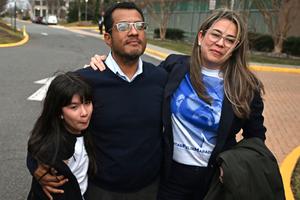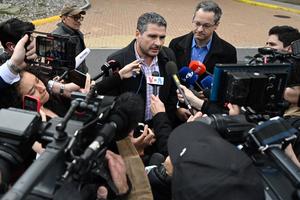Trump Administration Expands Education Funding Overseas to Faith-Based Schools
USAID recently announced a new education policy that expands education funding overseas to include private and faith-based schools in developing countries.

WASHINGTON — The U.S. Agency for International Development (USAID) recently announced a new education policy that expands education funding overseas to include private and faith-based schools in developing countries.
In introducing the new policy, which was announced Nov. 15, USAID Administrator Mark Green explained the important role that schools run by faith-based organizations and private entities play in these countries.
“The capacity and effectiveness of governments to provide high-quality education varies across countries and contexts,” he wrote. “Many children and youth would be denied access to education if not for non-state schools and providers — including private, for-profit, nonprofit, community, faith-based and other nongovernmental organizations.”
According to USAID, “303 million children, adolescents and youth between the ages of 5 to 17 — or one out of every five around the world — are out of school,” while more than 617 million children and adolescents don’t have a “minimum proficiency in reading or math, regardless of whether or not they attend schools.”
Julie Cram, USAID’s deputy assistant administrator for education, spoke with the Register Nov. 20 about how the new policy recognizes the unique role that faith-based organizations play in addressing this crisis and how the agency plans to utilize partnerships with these organizations.
“We recognize that faith-based organizations are already filling, in many cases, a large percentage of education in the developing world,” Cram noted, pointing out that private institutions provide for “nearly 14% of primary school-age students in low-income countries and upward of 24% in some of the lower-middle-income countries.”
Reaching the Marginalized
Cram explained that for children in isolated rural areas, faith-based groups sometimes provide their only opportunity for an education.
“Often, developing countries fundamentally lack the resources and the capacity to provide access and quality education, especially to kids that are in harder-to-reach rural areas; and in those cases, without the role of faith-based schools, the children would be denied access to education writ large,” she said.
When it comes to countries torn apart by conflict, it can prove almost impossible to provide access to education. Cram said that’s another area where faith-based groups are essential.
She pointed out that “one out of every three schoolchildren, approximately 104 million, live in countries affected by conflict and crisis.”
“The policy prioritizes our work in crisis and conflict contexts; and as you can imagine, faith-based organizations particularly in those contexts are really one of the only ways to reach these children,” she emphasized.
This was also something Administrator Green noted in an interview with EWTN’s Lauren Ashburn. Many children in these situations are “in camps or they’re on the move, and so how do we reach them?” he asked.
“Very often, it’s working with nontraditional schools or faith-based schools and institutions who are oftentimes working in these areas,” he said, “so they’re able to deliver some semblance of an education.”
According to Cram, the agency has already worked with faith groups for a long time, including the University of Notre Dame’s Alliance for Catholic Education in Haiti, a country where almost 90% of the education for primary-school-age kids is run by private and faith-based schools.
‘New Ways to Engage’
However, while the agency has worked with faith-based groups in the past, Cram said the new policy “encourages our mission to understand the role of faith-based institutions in their countries and, frankly, ask them to identify new ways to engage with them,” adding that the agency wants to “understand the role that faith-based institutions play and the gap that they’re filling.”
She gave the example of USAID’s work in the Democratic Republic of the Congo (DRC) where — like Haiti — a large percentage of the schools are private or faith-based.
“In places like the DRC, we know that the majority — perhaps even upward of 70% of the education — is being delivered by faith-based institutions,” she said. “We’d like to be able to understand, particularly in crisis and conflict areas, what does that footprint really look like? What is our engagement with them? How can it be more robust?”
Ultimately, Cram explained, USAID is looking to the role that these private institutions play in order to work toward the larger goal of “country ownership of an education-sector strategy.”
She said the agency “encourages our partner countries as well as our missions to really look at that particularly country’s context and be with them on their own journey, so to speak, on their own journey to self-reliance.”
Last week, Administrator Green told EWTN that for him this push to ensure children in developing countries have access to an education is personal.
He and his wife taught at a Quaker school in Kenya 30 years ago and experienced firsthand the good that institution was able to do in the community.
“We saw how desperate kids were to get what would be a pale shadow of the education that I think we take for granted here,” he said. “It was a wonderful opportunity to help marginalized kids, kids who would otherwise be entirely left behind, give them some of the skills that they would need to be able to compete and to be successful. Their passion is what drives me. If I can harness any of that, then we’ll be successful.”
Praise of Faith Leaders
Conservative and religious leaders praised USAID’s new focus on faith-based groups.
J. Kenneth Blackwell, former U.S. ambassador to the U.N. Human Rights Commission, called the move “essential in safeguarding education systems for the world’s most impoverished youth.”
“These children, living in increasingly fragile environments, tainted with violent conflict, natural disasters and humanitarian crises, would often not have access to education if not for the work of missionaries and faith-based providers already in their communities,” he said. “It has never been more crucial to financially support these organizations, and I thank President Trump for allowing our taxpayer dollars to reach even farther in helping those who need it most.”
Andrea Picciotti-Bayer, legal adviser with The Catholic Association Foundation, said the move would help U.S. assistance extend further to those in need.
“Thanks to the new USAID education policy, our annual taxpayer-funded aid will go even farther, by including non-state groups,” she commented, “especially faith-based organizations, that are already on the front lines of educating impoverished youth — with attention to girls as well as boys — around the world.”
Tony Perkins, president of Family Research Council, commented that the move came at a crucial time: “In the midst of a learning crisis, where one in five children around the world are out of school, partnering with front-line organizations like faith-based missionaries and schools is essential in guaranteeing that resources reach the most vulnerable among us.”
Lauretta Brown writes from Washington, D.C.

















